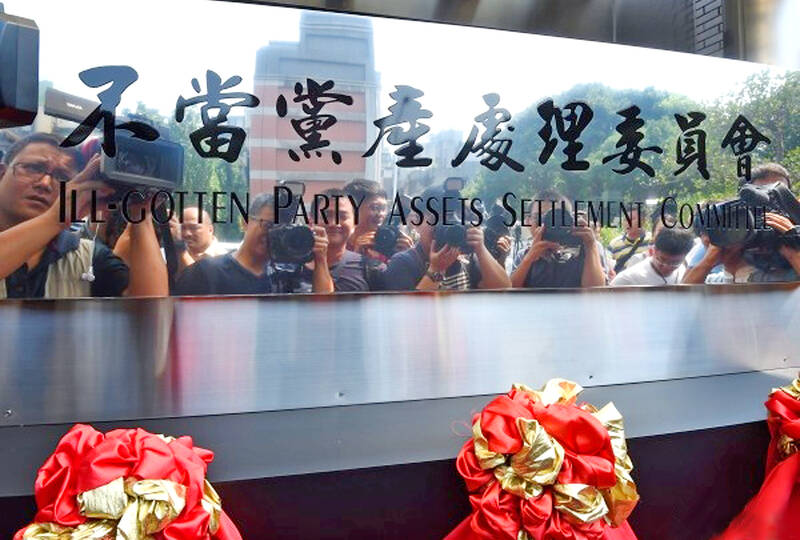The Ill-gotten Party Assets Settlement Committee for the first time has taken over the stock of companies after the Supreme Administrative Court on Thursday rejected the Chinese Nationalist Party’s (KMT) appeal of a decision to nationalize Central Investment Co and Hsinyutai Co, which are estimated to be worth a combined NT$15.6 billion (US$498.32 million).
The committee would consult lawyers on how to proceed, as ongoing lawsuits might prevent it from immediately acting on the ruling, a source in the committee said on Friday on condition of anonymity.
The committee in 2016 declared that the two firms were illegally obtained assets, prompting the KMT and executives from the companies to file three separate lawsuits against the decision.

Photo: Liu Hsin-de, Taipei Times
The companies say that nationalization would be illegal.
The High Administrative Court ruled against the KMT, but the other two cases have been remanded, with the administrative court saying the firms “were not the appropriate entities to take the issue to court,” the source said.
The Promoting Transitional Justice Fund, which is managed by the National Development Council, has been looking into the procedures involved in transferring the ownership of the stocks, the source said.
There are no procedures for transferring ownership of stocks, they said.
The stocks, once transferred, would be subject to Article 7 of the Act on Promoting Transitional Justice (促進轉型正義條例), meaning that the Promoting Transitional Justice Fund would manage them — including for use in the promotion of transitional justice and human rights education, long-term healthcare, social welfare policies and other such causes, the source added.
Both companies would be considered government assets and the state would assign board members to finalize their nationalization, they said.
It is too early to consider the possibility of the government selling the stocks to allow the firms to transition to private ownership, they said.
Rejection of the KMT’s lawsuit upheld Constitutional Interpretation No. 793 — which established the act — the committee said, adding that recovery of former national assets upholds the ideals of liberty, democracy and the rule of law as represented by the Constitution.
KMT Secretary-General Justin Huang (黃健庭) accused the Democratic Progressive Party government of a “purge under the guise of transitional justice.”
It is regrettable that the administrative court has become an accomplice in this matter, Huang said.
Additional reporting by Shih Hsiao-kuang

Chinese Nationalist Party (KMT) Chairman Eric Chu (朱立倫), spokeswoman Yang Chih-yu (楊智伃) and Legislator Hsieh Lung-chieh (謝龍介) would be summoned by police for questioning for leading an illegal assembly on Thursday evening last week, Minister of the Interior Liu Shyh-fang (劉世芳) said today. The three KMT officials led an assembly outside the Taipei City Prosecutors’ Office, a restricted area where public assembly is not allowed, protesting the questioning of several KMT staff and searches of KMT headquarters and offices in a recall petition forgery case. Chu, Yang and Hsieh are all suspected of contravening the Assembly and Parade Act (集會遊行法) by holding

PRAISE: Japanese visitor Takashi Kubota said the Taiwanese temple architecture images showcased in the AI Art Gallery were the most impressive displays he saw Taiwan does not have an official pavilion at the World Expo in Osaka, Japan, because of its diplomatic predicament, but the government-backed Tech World pavilion is drawing interest with its unique recreations of works by Taiwanese artists. The pavilion features an artificial intelligence (AI)-based art gallery showcasing works of famous Taiwanese artists from the Japanese colonial period using innovative technologies. Among its main simulated displays are Eastern gouache paintings by Chen Chin (陳進), Lin Yu-shan (林玉山) and Kuo Hsueh-hu (郭雪湖), who were the three young Taiwanese painters selected for the East Asian Painting exhibition in 1927. Gouache is a water-based

Taiwan would welcome the return of Honduras as a diplomatic ally if its next president decides to make such a move, Minister of Foreign Affairs Lin Chia-lung (林佳龍) said yesterday. “Of course, we would welcome Honduras if they want to restore diplomatic ties with Taiwan after their elections,” Lin said at a meeting of the legislature’s Foreign Affairs and National Defense Committee, when asked to comment on statements made by two of the three Honduran presidential candidates during the presidential campaign in the Central American country. Taiwan is paying close attention to the region as a whole in the wake of a

OFF-TARGET: More than 30,000 participants were expected to take part in the Games next month, but only 6,550 foreign and 19,400 Taiwanese athletes have registered Taipei city councilors yesterday blasted the organizers of next month’s World Masters Games over sudden timetable and venue changes, which they said have caused thousands of participants to back out of the international sporting event, among other organizational issues. They also cited visa delays and political interference by China as reasons many foreign athletes are requesting refunds for the event, to be held from May 17 to 30. Jointly organized by the Taipei and New Taipei City governments, the games have been rocked by numerous controversies since preparations began in 2020. Taipei City Councilor Lin Yen-feng (林延鳳) said yesterday that new measures by